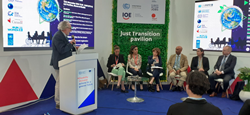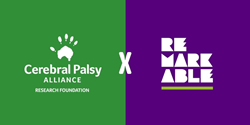
COP27 panel discussing the need for a disability inclusive green transition where it was highlighted that progress on disability inclusion must be tracked. Data is key!
“We are excited by the developments at COP27. But we need access to financial resources to develop technical capacity within both the climate and the disability sectors in order to ensure people with disabilities are not left behind,” said Dominic Haslam, IDDC.
GENEVA, Switzerland (PRWEB)
November 21, 2022
“We suffer climate change the most but are the least included in climate decisions,” said a person with disabilities participating in COP27.
The 27th Conference of Parties to the United Nations Framework Convention on Climate Change (COP27) has concluded in Sharm El-Sheikh, Egypt. Little attention was given to the rights of the one billion people with disabilities who are among the most affected by the climate crisis. Despite years of advocacy by people with disabilities and their allies, and notwithstanding their obligations under the Paris Agreement and the United Nations Convention on the Rights of Persons with Disabilities, governments continue to fail to comply with their duties to respect, protect, and fulfill the rights of persons with disabilities in their response to climate change.
COP27 was ground-breaking for disability inclusion in many ways: the number of persons with disabilities participating multiplied compared to earlier conferences, as did the number of events addressing disability organized by different Governments, UN agencies, and other stakeholders. The main decision as well as the action plan for climate empowerment included references to people with disabilities for the first time.
“Finally, we have actionable language on disability adopted by the COP. The work plan for the Action on Climate Empowerment mandates States to include people with disabilities. If implemented, this means access to climate information, education, and public participation. People with disabilities are being seen in the public forum as the climate actors they have always been,” said Jose Viera, Advocacy Director of the International Disability Alliance (IDA).
“This is indeed great news, achieved after huge effort by the disability movement. But we need to remember that a number of decisions were adopted without the involvement or mention of people with disabilities.”
On the other hand, the U.N. climate negotiations and decision-making processes remain inaccessible for persons with disabilities and their organizations, as they still lack an officially recognized disability caucus or constituency. Challenges to access venues and information for persons with disabilities in COP27 continued, despite UNFCCC’s mandate under the United Nations Disability Inclusion Strategy. The disability community, its requirements, and its perspective have also not been considered in decisions taken by Governments to address climate loss and damage, climate adaptation, or climate finance. The only topic in the negotiations where there has been progress on disability inclusion focused on action for climate empowerment.
The on-going failure of Governments to ensure disability-inclusive climate action is also clear from the latest status report on Disability Inclusion in National Climate Commitments and Policies released by the Disability Inclusive Climate Action Research Program at McGill University and IDA.
Released earlier today and taking into account the most recent versions of the Nationally Determined Contributions (NDCs) submitted by Governments, the report finds that only 37 of the 193 Governments that have signed onto the Paris Agreement refer to persons with disabilities in some way in their NDCs setting out their main commitments on climate action.
Of these, only 14 State Governments include concrete measures to ensure disability inclusion in climate policies. At the domestic level, only 46 Governments refer to persons with disabilities in their climate adaptation policies, and only 15 Governments include concrete measures to ensure that persons with disabilities are included in efforts to ensure that populations can cope with the impact of a changing climate.
The report concludes that even when Governments refer to disability, many do so in a cursory manner, without including meaningful mechanisms to consult people with disabilities or ensure their rights are respected in climate policies.
The status report shows that there is one bright spot. The second NDC submitted by Vanuatu stands alone in setting out a number of concrete steps to involve people with disabilities and integrate their needs in its responses to climate change.
“The failure to integrate the disability community and their rights in climate policies does not only put the lives of people with disabilities at risk and reinforce social inequalities. It undermines the effectiveness of our efforts to reduce carbon emissions and ensure the climate resilience of our societies,” explains Sébastien Jodoin, law professor and director of the Disability Inclusive Climate Action Research Program at McGill University, who co-authored the status report.
“The example of Vanuatu demonstrates that adopting disability-inclusive climate policies is not out of reach, but quite feasible with genuine commitment and meaningful consultation with persons with disabilities and their representative organizations.”
“We are excited by the developments at COP27. But we need access to financial resources to develop technical capacity within both the climate and the disability sectors in order to ensure people with disabilities are not left behind,” said Dominic Haslam, on behalf of the International Disability and Development Consortium. “We call on governments, mainstream environmental organizations and climate advocates to prioritize disability inclusion in their work, and help us deliver on this shared vision.”
The report is available in PDF here and in Word here.
For additional information, contact:
Elham Youssefian
Inclusive Humanitarian Action and Disaster Risk Reduction Advisor, IDA
Email: eyoussefian@ida-secretariat.org
For additional information on the report, its methodology and findings, contact:
Sébastien Jodoin
Associate Professor & Canada Research Chair in Human Rights, Health, and the Environment, McGill University, Faculty of Law
Email: sebastien.jodoin-pilon@mcgill.ca
For additional information on IDDC, contact:
Dominic Haslam, IDDC Chair
Email: dhaslam@sightsavers.org












